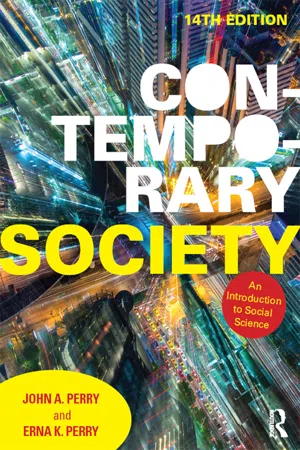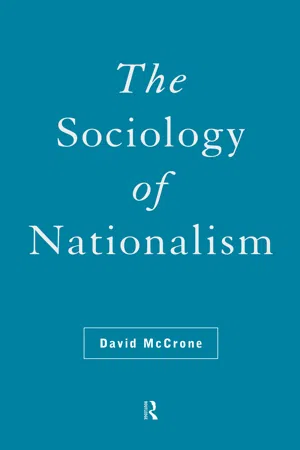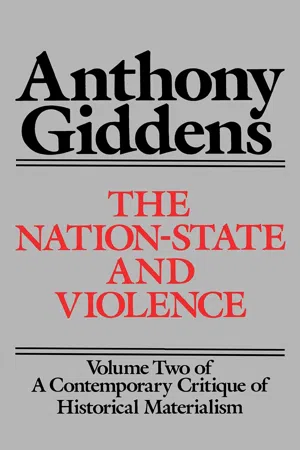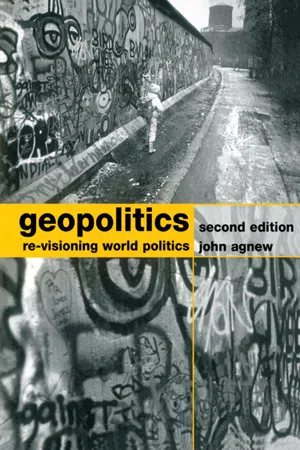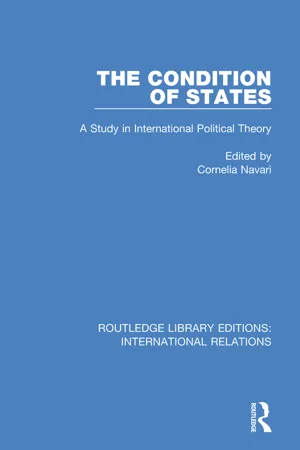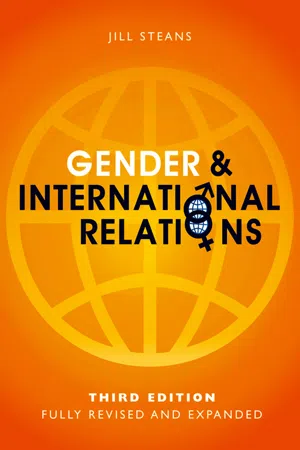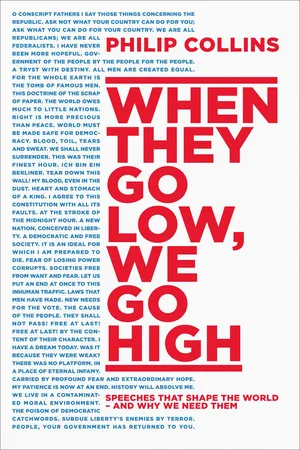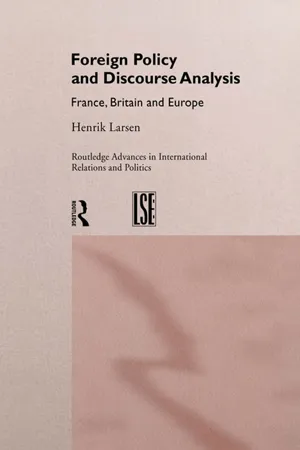Politics & International Relations
Nation State
A nation state is a political entity characterized by a defined territory, a permanent population, a government, and the capacity to enter into relations with other states. It is often associated with a shared sense of identity, culture, and history among its people. The concept of the nation state has been influential in shaping modern international relations and governance structures.
Written by Perlego with AI-assistance
Related key terms
8 Key excerpts on "Nation State"
- eBook - ePub
Contemporary Society
An Introduction to Social Science
- John Perry, Erna Perry(Authors)
- 2016(Publication Date)
- Routledge(Publisher)
Added to these shortcomings of the international system is the rapidity with which change occurs in the world. There has been a fundamental transformation in the bases of power from Western Europe to the United States and the Soviet Union in the last century. A number of nations have become independent from colonial empires. Another rearrangement has occurred with the fall of communism in the former Soviet Union. The distribution of power is continually fluctuating from one group of states to another, a process that in all probability will continue to take place in the future. Finally, the ongoing changes in technology, not least in the field of weapons, will continue to have an impact on nations.The discipline of international relations is, therefore, a vast and complex field. It concerns activities as diverse as war and humanitarian assistance, trade and investment, tourism and the Olympic Games. The core of inquiry of this discipline consists of three questions: (1) How do states act, and particularly why do they act the way they do toward one another (what is their national interest as expressed by their foreign policies)? (2) How do states attain their goals and objectives (what are their capabilities in terms of power)? (3) What are the main characteristics of the interactions between states (diplomacy, aid, exchange, cooperation)? First, however, we should have well in mind what states are and how they sometimes differ from nations, and in what ways their geographic location and the resources at their disposal affect their role on the world stage.The State and the NationA state is defined as a unit consisting of a population that occupies a definite territory, that is subject to a sovereign government, and that has a regime recognized as legitimate by other states. The state and the nation, then, are not quite the same thing, and it is more accurate to speak of a nation–state or a national state. A nation is a large social grouping whose people share common customs, language, heritage, and a sense of group identity. A nation may be split and living under the jurisdiction of several different states (such as the Albanians living in Kosovo or the Kurds living in Turkey and Iraq), or a nation may have no state (such as the Palestinians now and the Jews before the establishment of Israel), or a state may have many nations living within its boundaries (as was the case in the former Soviet Union, among other pluralist societies). The first European states were true nation–states because the population of each was really a nation. But the population of a modern state is more likely to consist of a number of nations that reside within its boundaries because of migration, war, colonialism, or a combination of these factors. - eBook - ePub
The Sociology of Nationalism
Tomorrow's Ancestors
- David McCrone(Author)
- 2002(Publication Date)
- Routledge(Publisher)
chapter 1 , well understood the distinction between state and nation, defined the key characteristics of the modern state as follows: territoriality—having fixed and defensible borders; control of the means of violence—both internally and externally; an impersonal structure of power—the idea of a sovereign and impersonal political order; and legitimacy—requiring the loyalty of its citizens (Held, 1992).Does this reduction of the nation to the state matter? Our argument here is that it does, because the concepts actually operate on different planes, and lead us to imagine that modern states have captured political and cultural power. This is problematic because the ideal-typical process had always a much more messy reality lying behind it. Particularly in the late twentieth century, the concepts are coming apart. At this stage we need to inject a third, related, concept, that of ‘society’ or ‘civil society’. If the ‘state’ is in essence a political concept, then ‘society’ is a sociological one. Broadly speaking, we can identify two ways of talking about society. Most sociologists use society in a fairly unproblematic and implicit way. It is, simply, the state. In the words of the sociologist Zygmunt Bauman: ‘It seems that most sociologists of the era of modern orthodoxy believed that—all being said—the nation-state is close enough to its own postulate of sovereignty to validate the use of the theoretical expression—the ‘society’ concept—as an adequate framework for sociological analysis’ (1992:57).The second sense of society is as ‘Society’ (capital S). This is a higher level of abstraction, and is used to refer to the broad, common patterns of human organisation, to how people relate to each other, as well as its subsets—industrial society, capitalist society and so on. In the main, however, when sociologists today talk about ‘society’, they are usually referring to ‘nation-states’. Alain Touraine observed: - eBook - ePub
- Anthony Giddens(Author)
- 2013(Publication Date)
- Polity(Publisher)
The combination of a reflexively monitored global system of nation-states, together with the pre-eminent military-industrial power wielded by the USA and Soviet Union, are the main distinguishing features of the present period. Each of the superpowers has its geopolitically proximate ‘sphere of influence’, and each has its diplomatically cultivated connections of dependency or alliance across the face of the globe. These involvements have very definite consequences for the internal political and economic systems of the states involved. But to see them as acting in a oneway fashion to limit the sovereignty of states in general would be misleading. The period since the Second World War has seen a considerable development in the effective autonomy of a variety of states – some being of very recent provenance – at the same time as that of others has been reduced. For reasons I have already mentioned, these should be seen as linked developments rather than distinct and separate ones.Types of Nation-StateMany classifications of modern states exist in the literature of political science and sociology. Given that ‘nation-state’ is equivalent to ‘society’, it is hardly surprising that categorizations should proliferate, since there are as many criteria of classification as there are modes of identifying major institutions. In the light of the discussion in this and the foregoing chapters, however, three bases of classification suggest themselves as useful. Nation-states exist as entities in a world state system, in which a bipolar distribution of industrial and military power is pre-eminent. One means of classification, therefore, should be a geo-political one, in which the positions of the two leading powers supply the poles around which the other states gravitate. Such a classification suggests the following categories:1 Focal/Hegemonic 2 Adjacent/Subsidiary 3 Central/Aligned 4 Central/Non-Aligned 5 Peripheral/Aligned 6 Peripheral/Non-Aligned.Only the USA and the USSR – at present at least – belong in category 1. They have a hegemonic position within their spheres of influence and occupy dominant places within the world system, although not in any sense akin to traditional imperial centres or to colonial empires. The bipolar character of the world system does not date from Yalta, but from a slightly later time. Until a short while after Yalta it seemed possible that the USA might retreat into its erstwhile isolationism; or that its role in world politics would be a unique one as the sole possessor of nuclear weapons. Britain was the main front-runner in pursuing a policy of containment against the Soviet Union. The Truman Doctrine of 1947, in which the American government assumed the British responsibilities of financial aid in Greece and Turkey and offered assistance to anti-Soviet regimes, was one watershed; the attainment of nuclear weaponry by the USSR was the other. NATO and the Warsaw Pact have given direct substance to the bipolar division of military power. Mutual acceptance of state sovereignty as a universal principle, however, has meant that the bipolar distribution of power has remained diffuse in its consequences. Within each of the two blocs, all existing nation-states have a developed administrative autonomy, with the superpowers not having a complete nuclear monopoly. - eBook - ePub
Geopolitics
Re-Visioning World Politics
- John Agnew(Author)
- 2004(Publication Date)
- Routledge(Publisher)
Three analytically distinct but invariably related assumptions underpin the territorial trap: thinking and acting as if the world were made up entirely of states exercising power over blocks of space that between them exhaust the politico-geographical form of world politics. The first, and most deeply rooted, is that modern state sovereignty requires clearly bounded territorial spaces. The modern state differs from all other types of organization by its claim to total sovereignty over its territory. Defending the security of its particular spatial sovereignty and the political life associated with it is the primary goal of the territorial state. Vested at one time in the person of the monarch, or other leader within a hierarchy of orders from the lowest peasant to the warriors, priests and nobles, sovereignty is now vested in territory.The second crucial assumption is that there is a fundamental opposition between domestic and foreign affairs in the modern world. This rests on the view common to Western political theory that states are akin to individual persons struggling for wealth and power in a hostile world. One state’s economic and political gains always come at the expense of others. Only inside the boundaries of the state, therefore, are civic culture and political debate possible. Outside, reasons of state (pursuit of the state’s interests) rule supreme. This view fixes processes of political and economic competition at the level of the system of states.Third, and finally, the territorial state acts as the geographical container of modern society. Social and political organization are defined in terms of this or that state. Thus, we speak and write unselfconsciously of ‘American’ or ‘Italian’ society, as if the boundaries of the state are also the boundaries of whatever social or political process we might be interested in. Other geographical scales of thinking or analysis are thereby precluded. Often this is because the state is seen as the guarantor of social order in modern societies. The state substitutes for the self-reproducing cultural order that can be found in so-called traditional societies (this ties back into the theme of Chapter 3 - eBook - ePub
- Cornelia Navari(Author)
- 2015(Publication Date)
- Routledge(Publisher)
The conception of the public authority as a corporation produces a unitary conception of rule making, despite the diversity and complexity of actual decision making. From the international and legal point of view, the state speaks with one voice; this is integral to its definition as a legal person. Authority may reside with many agencies within the political community, but which is to be identified as final authority is an entailment of this mode of political organization, certainly for the purposes of international law making. In international law, government and the effective agency of the state, indeed the sovereign power, is located by locating the treaty right. (And some have argued that locating the treaty right locates the effective sovereignty of the state.) Thus, for the student of international relations, the relevant groups and forces, those elements of political culture and of the abstracted society which matter, are those which impinge on the treaty right.But the unitary conception of the state is no mere legal or analytical convenience. More importantly, it derives from the modern concept of sovereignty as expressing a 'public power'. In contemporary civic orders with secular bases, in civil orders dominated by the idea of a power which ascends from some community, be it a national community, or the proletariat or citizenship within a civic community, the community is expressed and realized through the notion of a public sovereignty, or there being a (single) public power in which all citizens share. The unitary conception of the modern state was enormously strengthened by the notion of a communally based public power.The second important characteristic of a state from the legal point of view is the nature of state jurisdiction. The latter is, indeed, very important for understanding the modern form of political association which is the state. By the legal concept of the state, indeed the modern meaning of the state, authority is exercised over territory, and only incidentally over people. There is a territorial domain in which certain laws operate which apply only over those in that territory. Thus, legal conditions and the operative rules of existence alter with territorial shifts. (Equally, however, it is possible for legal conceptions to shift, to divide, to encompass partial or open web legal orders, through which a legal community can be enlarged to include others for defence or economic purposes, and for the concept of a territory to include multiple territories, accordingly.) - eBook - ePub
- Jill Steans(Author)
- 2013(Publication Date)
- Polity(Publisher)
In contrast, critical theorists of all persuasions, including many strands of feminist thought, interrogate how the boundaries of political communities are constructed and reproduced, as well as the consequences of such constructions. Furthermore, rather than taking the state as given, critical theorists are interested in exploring possibilities for change or transformation in the state system or society of states. Gender is relevant not only to specific ‘problems’ but to the construction and reproduction of state boundaries and identities.After unpacking the concept of the state, the first section of this chapter turns to one of the foremost problems interrogated in IR: war (violence) as a legitimized and sanctioned practice in international relations. The second section concentrates on nationalism (or, more properly, nationalisms) as a dominant construction of identity, and the role of nationalist ideologies or discourses in legitimizing state power and state-sanctioned violence. The third section takes a closer look at gender and sexuality in the context of citizenship and rights claims. Key areas of interest here are the role of the state in demarcating rights and obligations of citizenship and in policing the boundaries between citizens (insiders) and ‘foreigners’ (outsiders). The chapter concludes by reflecting on a number of responses to the challenges of difference in diversity in international politics that foreground ethical issues and social justice.
In IR textbooks, states are usually defined according to the following criteria. To be a state, it is necessary to have:The State in International Relations• a population (people);
• a territory (defined boundaries);
• a sovereign government;
• recognition (other states recognize the state boundaries and the sovereign claims of national governments).
There is an internal and external dimension to sovereignty. Internal sovereignty means that the government exercises jurisdiction over the people in a given territory. External sovereignty confers on states and governments the right to represent the national population in international transactions and negotiations. In the ‘real world’ things are not always so clear-cut. Nevertheless, the international system or international society is constituted on the basis of sovereign states, even if the politics of claims regarding statehood and sovereignty are sometimes somewhat messy. The implications of sovereignty are far-reaching. To give just two examples: first, sovereignty prescribes the legality of intervention; second, sovereignty means that individuals are not – generally – recognized as ‘actors’ in international relations. - eBook - ePub
When They Go Low, We Go High
Speeches that shape the world – and why we need them
- Philip Collins(Author)
- 2017(Publication Date)
- Fourth Estate(Publisher)
3Nation: Through Politics the Nation Is Defined
Imagined CommunitiesA nation has to be spoken into existence. That arresting phrase from John Quincy Adams from his speech to the House of Representatives on Independence Day 1821 rightly puts the nationalism before the nation. No country exists before people talk about it. It is not providence, or nature, or blood or culture that defines a nation in its origins. It is speech. It is the proclamation that the people are identical with one another in one crucial respect – they share a nationality. This means the articulation of a common history, shared stories of origin and symbols of national belonging. This claim is then recognised by the panoply of civic laws and attendant rights and this conjunction creates the modern nation-state. Citizenship becomes a legal fact, but nationhood starts as a political claim, in speech.Nations are, in the title of Benedict Anderson’s fine book, Imagined Communities . That does not mean they are not real. Linda Colley’s Britons: Forging The Nation 1707–1837 is the story of a conscious process of historical creation. A nation is an achievement before it is a place. In the case of the strange multinational state of Britain this is an especially precarious task. Nationhood is the expression of solidarity rather than the discovery of a common race of men. Anderson dates national consciousness to the invention of the printing press, the creation of the novel and the appearance of newspapers. For the first time, men and women could experience the stories of people like themselves, being lived out in their own day.Nationhood remains the most potent form of allegiance in modern politics. Affiliation to the nation has always trumped the claim of class and has always stood in the way of durable multinational institutions. Woodrow Wilson’s dream of a League of Nations lasted just twenty-seven years. It is revealing that no great speech has ever been made in defence of the United Nations, which ought to be a promising subject. As the Remain campaign unwittingly showed in Britain in 2016, it is also hard to find elevated rhetoric in defence of the idea of the European Union. Almost all of the memorable speeches about the European Union, certainly in Britain, as we shall see, have been in defence of the nation-state. - eBook - ePub
- Henrik Larsen(Author)
- 2005(Publication Date)
- Routledge(Publisher)
The British political discourse in the 1980s on the concepts of nation/state, Europe, security and the nature of international relationsNation/State
The historical aspects of the political discourse on state and nation will first be analysed. Central historical lines will be drawn. Then, it will be argued that the crucial concept in the dominant discourse historically, the nodal point, is ‘the sovereign parliament’ rather than state or nation. This section also includes an analysis of the way this dominant discourse presents what could be called the political layers in the British state – its spatial organisation and the central political units. Thereupon, the political discourse of the 1980s, the central object of study of the book, will be analysed.The historical discourse on state and nation: the proxy role of ‘sovereignty of parliament’
The aim of this section is to present the political discourse on state and nation as it was before the 1980s. As there is continuity in many important respects between the period before and after 1979, the analysis in this section will be relatively detailed. Many of the findings from this section will be drawn on when analysing the political discourse on the state and the nation in the 1980s.The making of the United Kingdom
The United Kingdom is a multinational state. English, Irish, Scots and Welsh came together in a process lasting from around 1400 (perhaps before in the case of Ireland and England) until around 1800 (the Southern Irish were to leave the union in 1921). The political unification took place through the Acts of Union between England and Wales in 1536, between England and Scotland in 1707 (which created ‘Great Britain’) and with Ireland in 1801.The most important driving force behind the political unification process can be interpreted as English conquest and political pressure (although in the case of Wales and Scotland there were also strong forces in favour of the union within these two countries). It was greatly facilitated by the already existing royal unions, first between England and Wales, later between England and Scotland (Clark 1991: 59).
Index pages curate the most relevant extracts from our library of academic textbooks. They’ve been created using an in-house natural language model (NLM), each adding context and meaning to key research topics.
